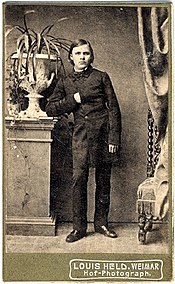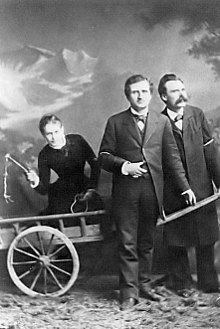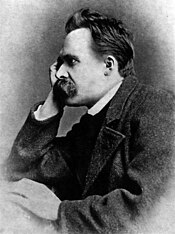Friedrich Nietzsche
| This article includes a list of references, but its sources remain unclear because it has insufficient inline citations. Please help to improve this article by introducing more precise citations where appropriate. (November 2010) |
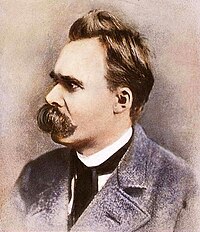 | |
| Full name | Friedrich Wilhelm Nietzsche |
|---|---|
| Born | October 15, 1844 Röcken bei Lützen, Prussia |
| Died | August 25, 1900 (aged 55) Weimar, Saxony, German Empire |
| Era | 19th century philosophy |
| Region | Western Philosophy |
| School | Weimar Classicism; precursor to Continental philosophy, existentialism, Individualism, postmodernism, poststructuralism |
| Main interests | aesthetics, ethics, ontology, philosophy of history, psychology, value-theory, poetry |
| Notable ideas | Apollonian and Dionysian, death of God, eternal recurrence, herd-instinct, master-slave morality, Übermensch, perspectivism, will to power, ressentiment, der letzte Mensch |
| Signature | |
Nietzsche's influence remains substantial within and beyond philosophy, notably in existentialism and postmodernism. His style and radical questioning of the value and objectivity of truth have resulted in much commentary and interpretation, mostly in the continental tradition. His key ideas include the death of God, perspectivism, the Übermensch, the eternal recurrence, and the will to power. Central to his philosophy is the idea of “life-affirmation,” which involves an honest questioning of all doctrines that drain life's expansive energies, however socially prevalent those views might be.[2]
Nietzsche began his career as a classical philologist before turning to philosophy. At the age of 24 he was appointed to the Chair of Classical Philology at the University of Basel (the youngest individual to have held this position), but resigned in 1879 due to health problems that plagued him most of his life. In 1889 he became mentally ill, possibly due to atypical general paralysis attributed to tertiary syphilis.[3] He lived his remaining years in the care of his mother until her death in 1897, then under the care of his sister until his death in 1900.
Contents[show] |
[edit] Life
[edit] Youth (1844–1869)
Born on October 15, 1844, Nietzsche grew up in the small town of Röcken, near Leipzig, in the Prussian Province of Saxony. He was named after King Frederick William IV of Prussia, who turned 49 on the day of Nietzsche's birth. (Nietzsche later dropped his given middle name, "Wilhelm".)[4] Nietzsche's parents, Carl Ludwig Nietzsche (1813–1849), a Lutheran pastor and former teacher, and Franziska Oehler (1826–1897), married in 1843, the year before their son's birth, and had two other children: a daughter, Elisabeth Förster-Nietzsche, born in 1846, and a second son, Ludwig Joseph, born in 1848. Nietzsche's father died from a brain ailment in 1849; his younger brother died in 1850. The family then moved to Naumburg, where they lived with Nietzsche's paternal grandmother and his father's two unmarried sisters. After the death of Nietzsche's grandmother in 1856, the family moved into their own house.Nietzsche attended a boys' school and then later a private school, where he became friends with Gustav Krug and Wilhelm Pinder, both of whom came from very respected families. In 1854, he began to attend Pforta in Naumburg, but after he showed particular talents in music and language, the internationally recognised Schulpforta admitted him as a pupil, and there he continued his studies from 1858 to 1864. Here he became friends with Paul Deussen and Carl von Gersdorff. He also found time to work on poems and musical compositions. At Schulpforta, Nietzsche received an important introduction to literature, particularly that of the ancient Greeks and Romans, and for the first time experienced a distance from his family life in a small-town Christian environment.
After graduation in 1864 Nietzsche commenced studies in theology and classical philology at the University of Bonn. For a short time he and Deussen became members of the Burschenschaft Frankonia. After one semester (and to the anger of his mother) he stopped his theological studies and lost his faith.[5] This may have happened in part because of his reading around this time of David Strauss's Life of Jesus, which had a profound effect on the young Nietzsche,[5] though in an essay entitled Fate and History written in 1862, Nietzsche had already argued that historical research had discredited the central teachings of Christianity.[6] Nietzsche then concentrated on studying philology under Professor Friedrich Wilhelm Ritschl, whom he followed to the University of Leipzig the next year. There he became close friends with fellow-student Erwin Rohde. Nietzsche's first philological publications appeared soon after.
In 1865 Nietzsche thoroughly studied the works of Arthur Schopenhauer. He owed the awakening of his philosophical interest to reading his Die Welt als Wille und Vorstellung and later admitted that he was one of the few thinkers that he respected, dedicating to him his essay Schopenhauer als Erzieher (Schopenhauer as Educator), one of his Untimely Meditations.
In 1866 he read Friedrich Albert Lange's History of Materialism. Schopenhauer and Lange influenced him. Schopenhauer was especially significant in the development of Nietzsche's later thought. Lange's descriptions of Kant's anti-materialistic philosophy, the rise of European Materialism, Europe's increased concern with science, Darwin's theory, and the general rebellion against tradition and authority greatly intrigued Nietzsche. The cultural environment encouraged him to expand his horizons beyond philology and to continue his study of philosophy.
In 1867 Nietzsche signed up for one year of voluntary service with the Prussian artillery division in Naumburg. However, a riding accident in March 1868 left him unfit for service.[7] Consequently Nietzsche turned his attention to his studies again, completing them and first meeting with Richard Wagner later that year.[8]
[edit] Professor at Basel (1869–1879)
In part because of Ritschl's support, Nietzsche received a remarkable offer to become professor of classical philology at the University of Basel. He was only 24 years old and had neither completed his doctorate nor received his teaching certificate. Despite the fact that the offer came at a time when he was considering giving up philology for science, he accepted.[9] To this day, Nietzsche is still among the youngest of the tenured Classics professors on record.[10] Before moving to Basel, Nietzsche renounced his Prussian citizenship: for the rest of his life he remained officially stateless.[11]Nevertheless, Nietzsche served in the Prussian forces during the Franco-Prussian War of 1870 to 1871 as a medical orderly. In his short time in the military he experienced much, and witnessed the traumatic effects of battle. He also contracted diphtheria and dysentery. Walter Kaufmann speculates that he might also have contracted syphilis along with his other infections at this time, and some biographers speculate that syphilis caused his eventual madness, though there is some disagreement on this matter.[12][13] On returning to Basel in 1870 Nietzsche observed the establishment of the German Empire and the following era of Otto von Bismarck as an outsider and with a degree of skepticism regarding its genuineness. At the University, he delivered his inaugural lecture, "Homer and Classical Philology". Nietzsche also met Franz Overbeck, a professor of theology, who remained his friend throughout his life. Afrikan Spir,[14] a little-known Russian philosopher and author of Denken und Wirklichkeit (1873), and his colleague the historian Jacob Burckhardt, whose lectures Nietzsche frequently attended, began to exercise significant influence on Nietzsche during this time.
Nietzsche had already met Richard Wagner in Leipzig in 1868, and (some time later) Wagner's wife Cosima. Nietzsche admired both greatly, and during his time at Basel frequently visited Wagner's house in Tribschen in the Canton of Lucerne. The Wagners brought Nietzsche into their most intimate circle, and enjoyed the attention he gave to the beginning of the Bayreuth Festival Theatre. In 1870 he gave Cosima Wagner the manuscript of 'The Genesis of the Tragic Idea' as a birthday gift. In 1872 Nietzsche published his first book, The Birth of Tragedy. However, his colleagues in the field of classical philology, including Ritschl, expressed little enthusiasm for the work, in which Nietzsche eschewed the classical philologic method in favor of a more speculative approach. In a polemic, Philology of the Future, Ulrich von Wilamowitz-Moellendorff dampened the book's reception and increased its notoriety. In response, Rohde (by now a professor in Kiel) and Wagner came to Nietzsche's defense. Nietzsche remarked freely about the isolation he felt within the philological community and attempted to attain a position in philosophy at Basel, though unsuccessfully.
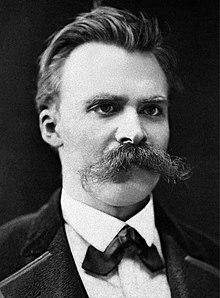
With the publication of Human, All Too Human in 1878 (a book of aphorisms on subjects ranging from metaphysics to morality and from religion to the sexes) Nietzsche's reaction against the pessimistic philosophy of Wagner and Schopenhauer became evident, as well as the influence of Afrikan Spir's Denken und Wirklichkeit.[15] Nietzsche's friendship with Deussen and Rohde cooled as well. In 1879, after a significant decline in health, Nietzsche had to resign his position at Basel. (Since his childhood, various disruptive illnesses had plagued him, including moments of shortsightedness that left him nearly blind, migraine headaches, and violent indigestion. The 1868 riding accident and diseases in 1870 may have aggravated these persistent conditions, which continued to affect him through his years at Basel, forcing him to take longer and longer holidays until regular work became impractical.)
[edit] Independent philosopher (1879–1888)
Because his illness drove him to find climates more conducive to his health, Nietzsche traveled frequently, and lived until 1889 as an independent author in different cities. He spent many summers in Sils Maria, near St. Moritz in Switzerland, and many winters in the Italian cities of Genoa, Rapallo and Turin and in the French city of Nice. In 1881, when France occupied Tunisia, he planned to travel to Tunis to view Europe from the outside, but later abandoned that idea (probably for health reasons).[16] While in Genoa, Nietzsche's failing eyesight prompted him to explore the use of typewriters as a means of continuing to write. He is known to have tried using the Hansen Writing Ball, a contemporary typewriter device.Nietzsche occasionally returned to Naumburg to visit his family, and, especially during this time, he and his sister had repeated periods of conflict and reconciliation. He lived on his pension from Basel, but also received aid from friends. A past student of his, Peter Gast (born Heinrich Köselitz), became a sort of private secretary to Nietzsche. To the end of his life, Gast and Overbeck remained consistently faithful friends. Malwida von Meysenbug remained like a motherly patron even outside the Wagner circle. Soon Nietzsche made contact with the music-critic Carl Fuchs. Nietzsche stood at the beginning of his most productive period. Beginning with Human, All Too Human in 1878, Nietzsche would publish one book (or major section of a book) each year until 1888, his last year of writing, during which he completed five.
In 1882 Nietzsche published the first part of The Gay Science. That year he also met Lou Andreas Salomé, through Malwida von Meysenbug and Paul Rée. Nietzsche and Salomé spent the summer together in Tautenburg in Thuringia, often with Nietzsche's sister Elisabeth as a chaperone. Nietzsche, however, regarded Salomé less as an equal partner than as a gifted student. Salomé reports that he asked her to marry him and that she refused, though the reliability of her reports of events has come into question.[17] Nietzsche's relationship with Rée and Salomé broke up in the winter of 1882/1883, partially because of intrigues conducted by Nietzsche's sister Elisabeth. Amidst renewed bouts of illness, living in near isolation after a falling-out with his mother and sister regarding Salomé, Nietzsche fled to Rapallo. Here he wrote the first part of Thus Spoke Zarathustra in only ten days.
After severing his philosophical ties with Schopenhauer and his social ties with Wagner, Nietzsche had few remaining friends. Now, with the new style of Zarathustra, his work became even more alienating and the market received it only to the degree required by politeness. Nietzsche recognized this and maintained his solitude, though he often complained about it. His books remained largely unsold. In 1885 he printed only 40 copies of the fourth part of Zarathustra, and distributed only a fraction of these among close friends, including Helene von Druskowitz.
In 1883 he tried and failed to obtain a lecturing post at the University of Leipzig. It was made clear to him that, in view of the attitude towards Christianity and the concept of God expressed in Zarathustra, he had become in effect unemployable at any German University. The subsequent "feelings of revenge and resentment" embittered him. "And hence my rage since I have grasped in the broadest possible sense what wretched means (the depreciation of my good name, my character and my aims) suffice to take from me the trust of, and therewith the possibility of obtaining, pupils."[18]
In 1886 Nietzsche broke with his editor, Ernst Schmeitzner, disgusted by his anti-Semitic opinions. Nietzsche saw his own writings as "completely buried and unexhumeable in this anti-Semitic dump" of Schmeitzner—associating the editor with a movement that should be "utterly rejected with cold contempt by every sensible mind".[19] He then printed Beyond Good and Evil at his own expense, and issued in 1886–1887 second editions of his earlier works (The Birth of Tragedy, Human, All Too Human, Dawn, and The Gay Science), accompanied by new prefaces in which he reconsidered his earlier works. Thereafter, he saw his work as completed for a time and hoped that soon a readership would develop. In fact, interest in Nietzsche's thought did increase at this time, if rather slowly and in a way hardly perceived by him. During these years Nietzsche met Meta von Salis, Carl Spitteler, and also Gottfried Keller. In 1886 his sister Elisabeth married the anti-Semite Bernhard Förster and traveled to Paraguay to found Nueva Germania, a "Germanic" colony—a plan to which Nietzsche responded with mocking laughter.[20] Through correspondence, Nietzsche's relationship with Elisabeth continued on the path of conflict and reconciliation, but they would meet again only after his collapse. He continued to have frequent and painful attacks of illness, which made prolonged work impossible. In 1887 Nietzsche wrote the polemic On the Genealogy of Morals.
During the same year Nietzsche encountered the work of Fyodor Dostoevsky, with whom he felt an immediate kinship.[21] He also exchanged letters with Hippolyte Taine, and then also with Georg Brandes. Brandes, who had started to teach the philosophy of Søren Kierkegaard in the 1870s, wrote to Nietzsche asking him to read Kierkegaard, to which Nietzsche replied that he would come to Copenhagen and read Kierkegaard with him. However, before fulfilling this undertaking, he slipped too far into sickness. In the beginning of 1888, in Copenhagen, Brandes delivered one of the first lectures on Nietzsche's philosophy.
Although Nietzsche had in 1886 announced (at the end of On The Genealogy of Morality) a new work with the title The Will to Power: Attempt at a Revaluation of All Values, he eventually seems to have abandoned this particular approach and instead used some of the draft passages to compose Twilight of the Idols and The Antichrist (both written in 1888).[22]
His health seemed to improve, and he spent the summer in high spirits. In the fall of 1888 his writings and letters began to reveal a higher estimation of his own status and "fate." He overestimated the increasing response to his writings, especially to the recent polemic, The Case of Wagner. On his 44th birthday, after completing Twilight of the Idols and The Antichrist, he decided to write the autobiography Ecce Homo. In the preface to this work—which suggests Nietzsche was well aware of the interpretive difficulties his work would generate—he declares, "Hear me! For I am such and such a person. Above all, do not mistake me for someone else."[23] In December, Nietzsche began a correspondence with August Strindberg, and thought that, short of an international breakthrough, he would attempt to buy back his older writings from the publisher and have them translated into other European languages. Moreover, he planned the publication of the compilation Nietzsche Contra Wagner and of the poems that composed his collection Dionysian-Dithyrambs.
[edit] Mental breakdown and death (1889–1900)

In the following few days, Nietzsche sent short writings—known as the Wahnbriefe ("Madness Letters")—to a number of friends (including Cosima Wagner and Jacob Burckhardt). To his former colleague Burckhardt, Nietzsche wrote: "I have had Caiaphas put in fetters. Also, last year I was crucified by the German doctors in a very drawn-out manner. Wilhelm, Bismarck, and all anti-Semites abolished."[25] Additionally, he commanded the German emperor to go to Rome to be shot, and summoned the European powers to take military action against Germany.[26]
On January 6, 1889 Burckhardt showed the letter he had received from Nietzsche to Overbeck. The following day Overbeck received a similarly revealing letter, and decided that Nietzsche's friends had to bring him back to Basel. Overbeck traveled to Turin and brought Nietzsche to a psychiatric clinic in Basel. By that time Nietzsche appeared fully in the grip of a serious mental illness, and his mother Franziska decided to transfer him to a clinic in Jena under the direction of Otto Binswanger. From November 1889 to February 1890 the art historian Julius Langbehn attempted to cure Nietzsche, claiming that the methods of the medical doctors were ineffective in treating Nietzsche's condition. Langbehn assumed progressively greater control of Nietzsche until his secretiveness discredited him. In March 1890 Franziska removed Nietzsche from the clinic, and in May 1890 brought him to her home in Naumburg. During this process Overbeck and Gast contemplated what to do with Nietzsche's unpublished works. In January 1889 they proceeded with the planned release of Twilight of the Idols, by that time already printed and bound. In February they ordered a fifty copy private edition of Nietzsche contra Wagner, but the publisher C. G. Naumann secretly printed one hundred. Overbeck and Gast decided to withhold publishing The Antichrist and Ecce Homo because of their more radical content. Nietzsche's reception and recognition enjoyed their first surge.
In 1893 Nietzsche's sister Elisabeth returned from Nueva Germania (in Paraguay) following the suicide of her husband. She read and studied Nietzsche's works, and piece by piece took control of them and of their publication. Overbeck eventually suffered dismissal, and Gast finally cooperated. After the death of Franziska in 1897 Nietzsche lived in Weimar, where Elisabeth cared for him and allowed people, including Rudolf Steiner (who in 1895 had written one of the first books praising Nietzsche)[27] to visit her uncommunicative brother. Elisabeth at one point went so far as to employ Steiner–at a time when he was still an ardent fighter against any mysticism–as a tutor to help her to understand her brother's philosophy. Steiner abandoned the attempt after only a few months, declaring that it was impossible to teach her anything about philosophy.[28]
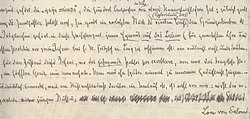
In 1898 and 1899 Nietzsche suffered at least two strokes, which partially paralysed him and left him unable to speak or walk. After contracting pneumonia in mid-August 1900 he had another stroke during the night of August 24 / August 25, and died about noon on August 25.[36] Elisabeth had him buried beside his father at the church in Röcken bei Lützen. His friend, Gast, gave his funeral oration, proclaiming: "Holy be your name to all future generations!"[37] Nietzsche had written in Ecce Homo (at the time of the funeral still unpublished) of his fear that one day his name would be regarded as "holy".
Elisabeth Förster-Nietzsche compiled The Will to Power from Nietzsche's unpublished notebooks, and published it posthumously. Because his sister arranged the book based on her own conflation of several of Nietzsche's early outlines, and took great liberties with the material, the consensus holds that it does not reflect Nietzsche's intent. Indeed, Mazzino Montinari, the editor of Nietzsche's Nachlass, called it a forgery in The 'Will to Power' does not exist. For example, Elisabeth removed aphorism 35 of The Antichrist, where Nietzsche rewrote a passage of the Bible (see The Will to Power and Nietzsche's criticisms of anti-Semitism and nationalism).
[edit] Citizenship, nationality, ethnicity
Nietzsche is commonly classified as a German philosopher.[38] The modern unified nation-state called Germany did not yet exist at the time of his birth, but the German Confederation of states did, and Nietzsche was a citizen of one of these, Prussia—for a time. When he accepted his post at Basel, Nietzsche applied for the annulment of his Prussian citizenship.[39] The official response confirming the revocation of his citizenship came in a document dated April 17, 1869,[40] and for the rest of his life he remained officially stateless.According to a common myth, Nietzsche's ancestors were Polish. Nietzsche himself subscribed to this story toward the end of his life. He wrote in 1888, "My ancestors were Polish noblemen (Nietzky); the type seems to have been well preserved despite three generations of German mothers."[41] At one point Nietzsche becomes even more adamant about his Polish Identity. “I am a pure-blooded Polish nobleman, without a single drop of bad blood, certainly not German blood.”[42] On yet another occasion Nietzsche stated “Germany is a great nation only because its people have so much Polish blood in their veins [...] I am proud of my Polish descent.”[43] Nietzsche believed his name might have been Germanized, in one letter claiming, "I was taught to ascribe the origin of my blood and name to Polish noblemen who were called Niëtzky and left their home and nobleness about a hundred years ago, finally yielding to unbearable suppression: they were Protestants."[44]
Most scholars dispute Nietzsche's account of his family's origins. Hans von Müller debunked the genealogy put forward by Nietzsche's sister in favor of a Polish noble heritage.[45] Max Oehler, the curator of Nietzsche Archive at Weimar, argued that all of Nietzsche's ancestors bore German names, even the wives' families.[41] Oehler claims that Nietzsche came from a long line of German Lutheran clergymen on both sides of his family, and modern scholars regard the claim of Nietzsche's Polish ancestry as "pure invention."[46] Colli and Montinari, the editors of Nietzsche's assembled letters, gloss Nietzsche's claims as a "mistaken belief" and "without foundation."[47] The name Nietzsche itself is not a Polish name, but an exceptionally common one throughout central Germany, in this and cognate forms (such as Nitsche and Nitzke). The name derives from the forename Nikolaus, abbreviated to Nick; assimilated with the Slavic Nitz, it first became Nitsche and then Nietzsche.[41]
It is not known why Nietzsche wanted to be thought of as Polish nobility. According to biographer R. J. Hollingdale, Nietzsche's propagation of the Polish ancestry myth may have been part of the latter's "campaign against Germany".[41]
[edit] Philosophy
A few of the themes that Nietzsche scholars have devoted the most attention to include Nietzsche's views on morality, his view that "God is dead" (and along with it any sort of God's-eye view on the world thus leading to perspectivism), his notions of the will to power and Übermensch, and his suggestion of eternal return.
[edit] Morality
In Daybreak Nietzsche begins his "Campaign against Morality".[48] He calls himself an "immoralist" and harshly criticizes the prominent moral schemes of his day: Christianity, Kantianism, and utilitarianism. In Ecce Homo Nietzsche called the establishment of moral systems based on a dichotomy of good and evil a "calamitous error",[49] and wished to initiate a re-evaluation of the values of the Judeo-Christian world.[50] He indicates his desire to bring about a new, more naturalistic source of value in the vital impulses of life itself.In both these works, Nietzsche's genealogical account of the development of master-slave morality occupies a central place. Nietzsche presents master-morality as the original system of morality—perhaps best associated with Homeric Greece. Here, value arises as a contrast between good and bad, or between 'life-affirming' and 'life-denying': wealth, strength, health, and power, the sort of traits found in a Homeric hero, count as good; while bad is associated with the poor, weak, sick, and pathetic, the sort of traits conventionally associated with slaves in ancient times.
Slave-morality, in contrast, comes about as a reaction to master-morality. Nietzsche associates slave-morality with the Jewish and Christian traditions. Here, value emerges from the contrast between good and evil: good being associated with other-worldliness, charity, piety, restraint, meekness, and submission; evil seen as worldly, cruel, selfish, wealthy, and aggressive. Nietzsche sees slave-morality born out of the ressentiment of slaves. It works to overcome the slave's own sense of inferiority before the (better-off) masters. It does so by making out slave weakness to be a matter of choice, by, e.g., relabeling it as "meekness."
Nietzsche sees the slave-morality as a source of the nihilism that has overtaken Europe. In Nietzsche's eyes, modern Europe, and its Christianity, exists in a hypocritical state due to a tension between master and slave morality, both values contradictorily determining, to varying degrees, the values of most Europeans (who are "motley"). Nietzsche calls for exceptional people to no longer be ashamed of their uniqueness in the face of a supposed morality-for-all, which Nietzsche deems to be harmful to the flourishing of exceptional people. However, Nietzsche cautions that morality, per se, is not bad; it is good for the masses, and should be left to them. Exceptional people, on the other hand, should follow their own "inner law." A favorite motto of Nietzsche, taken from Pindar, reads: "Become what you are."
[edit] Death of God, nihilism, perspectivism
The statement "God is dead", occurring in several of Nietzsche's works (notably in The Gay Science), has become one of his best-known remarks. On the basis of it, most commentators[51] regard Nietzsche as an atheist; others (such as Kaufmann) suggest that this statement reflects a more subtle understanding of divinity. In Nietzsche's view, recent developments in modern science and the increasing secularization of European society had effectively 'killed' the Christian God, who had served as the basis for meaning and value in the West for more than a thousand years.Nietzsche claimed the death of God would eventually lead to the loss of any universal perspective on things, and along with it any coherent sense of objective truth.[52] Instead we would retain only our own multiple, diverse, and fluid perspectives. This view has acquired the name "perspectivism".
Alternatively, the death of God may lead beyond bare perspectivism to outright nihilism, the belief that nothing has any inherent importance and that life lacks purpose. As Heidegger put the problem, "If God as the suprasensory ground and goal of all reality is dead, if the suprasensory world of the Ideas has suffered the loss of its obligatory and above it its vitalizing and upbuilding power, then nothing more remains to which man can cling and by which he can orient himself."[53] Developing this idea, Nietzsche wrote Thus Spoke Zarathustra, therein introducing the concept of a value-creating Übermensch. According to Lampert, "the death of God must be followed by a long twilight of piety and nihilism (II. 19; III. 8). […] Zarathustra's gift of the superman is given to a mankind not aware of the problem to which the superman is the solution."[54]
[edit] Will to power
Nietzsche's notion of the will to power can also be viewed as a response to Schopenhauer's "will to live." Writing a generation before Nietzsche, Schopenhauer had regarded the entire universe and everything in it as driven by a primordial will to live, thus resulting in all creatures' desire to avoid death and to procreate. Nietzsche, however, challenges Schopenhauer's account and suggests that people and animals really want power; living in itself appears only as a subsidiary aim—something necessary to promote one's power. Defending his view, Nietzsche describes instances where people and animals willingly risk their lives to gain power—most notably in instances like competitive fighting and warfare. Once again, Nietzsche seems to take part of his inspiration from the ancient Homeric Greek texts he knew well: Greek heroes and aristocrats or "masters" did not desire mere living (they often died quite young and risked their lives in battle) but wanted power, glory, and greatness. In this regard he often mentions the common Greek theme of agon or contest.
In addition to Schopenhauer's psychological views, Nietzsche contrasts his notion of the will to power with many of the other most popular psychological views of his day, such as that of utilitarianism. Utilitarianism—a philosophy mainly promoted, in Nietzsche's days and before, by British thinkers such as Bentham and Stuart Mill—claims that all people fundamentally want to be happy. But this conception of happiness found in utilitarianism Nietzsche rejected as something limited to, and characteristic of, English society only.[59] Also Platonism and Christian neo-Platonism–which claim that people ultimately want to achieve unity with The Good or with God–are philosophies he criticizes. In each case, Nietzsche argues that the "will to power" provides a more useful and general explanation of human behavior.
[edit] Übermensch
"I teach you the overman. Man is something that shall be overcome. What have you done to overcome him? … All beings so far have created something beyond themselves; and do you want to be the ebb of this great flood, and even go back to the beasts rather than overcome man? What is ape to man? A laughing stock or painful embarrassment. And man shall be that to overman: a laughingstock or painful embarrassment. You have made your way from worm to man, and much in you is still worm. Once you were apes, and even now, too, man is more ape than any ape.... The overman is the meaning of the earth. Let your will say: the overman shall be the meaning of the earth.... Man is a rope, tied between beast and overman—a rope over an abyss … what is great in man is that he is a bridge and not an end."
[edit] Eternal return
[edit] Reading and influence

Nietzsche's philosophy, while highly innovative and revolutionary, was indebted to many predecessors, including the pre-Socratic Greek thinker Heraclitus. Heraclitus was known for the rejection of the concept of being as a constant and eternal principle of universe, and his embrace of "flux" and incessant change. His symbolism of the world as "child play" marked by amoral spontaneity and lack of definite rules was appreciated by Nietzsche.[66] From his Heraclitean sympathy Nietzsche was also a vociferous detractor of Parmenides, who opposed Heraclitus and believed all world is a single Being with no change at all.[67]
Nietzsche expressed admiration for 17th century French moralists such as La Rochefoucauld, Jean de La Bruyère and Vauvenargues,[68] as well as for Stendhal.[69] The organicism of Paul Bourget influenced Nietzsche,[70] as did that of Rudolf Virchow and Alfred Espinas.[71] Nietzsche early learned of Darwinism through Friedrich Lange.[72] Notably, he also read some of the posthumous works of Charles Baudelaire,[73] Tolstoy's My Religion, Ernest Renan's Life of Jesus and Fyodor Dostoyevsky's The Possessed.[73][74] Nietzsche called Dostoevsky "the only psychologist from whom I have anything to learn."[75] Comments in several passages suggest that he responded strongly and favorably to the work of Ralph Waldo Emerson. While Nietzsche never mentions Max Stirner, the similarities in their ideas have prompted a minority of interpreters to suggest he both read and was influenced by him.[76] In 1861 Friedrich Nietzsche wrote an enthusiastic essay on his "favorite poet", Friedrich Hölderlin, mostly forgotten at that time[77].
[edit] Reception
In the years after his death in 1900, Nietzsche's works became better known, and readers have responded to them in complex and sometimes controversial ways. Many Germans eventually discovered his appeals for greater individualism and personality development in Thus Spoke Zarathustra, but responded to those appeals divergently. He had some following among left-wing Germans in the 1890s; in 1894–1895 German conservatives wanted to ban his work as subversive. During the late 19th century Nietzsche's ideas were commonly associated with anarchist movements and appear to have had influence within them, particularly in France and the United States.[78] The poet W.B. Yeats helped to raise awareness of Nietzsche in Ireland.[79] H.L. Mencken produced translations of Nietzsche's works that helped to increase knowledge of his philosophy in the United States.
By World War I, Nietzsche had acquired a reputation as an inspiration for right-wing German militarism. German soldiers received copies of Thus Spoke Zarathustra as gifts during World War I.[80][81] The Dreyfus Affair provides another example of his reception: the French anti-semitic Right labelled the Jewish and Leftist intellectuals who defended Alfred Dreyfus as "Nietzscheans".[82] Nietzsche had a distinct appeal for many Zionist thinkers at the turn of the century. It has been argued that his work influenced Theodore Herzl,[83] and Martin Buber went so far as to extoll Nietzsche as a "creator" and "emissary of life".[84] Bertrand Russell, in his History of Western Philosophy was scathing about Nietzsche, calling his work the "mere power-phantasies of an invalid", referring to him as a "megalomaniac", and writing that he was a philosophical progenitor of the Nazis and fascists.[85]
Nietzsche's growing prominence suffered a severe setback when his works became closely associated with Adolf Hitler and the German Reich. Many political leaders of the twentieth century were at least superficially familiar with Nietzsche's ideas, although it is not always possible to determine whether or not they actually read his work. Hitler, for example, probably never read Nietzsche, and if he did, his reading was not extensive,[86] although he was a frequent visitor to the Nietzsche museum in Weimar and did use expressions of Nietzsche's, such as "lords of the earth" in Mein Kampf.[87] The Nazis made selective use of Nietzsche's philosophy. Mussolini and Charles de Gaulle read Nietzsche.[88][89] It has been suggested that Theodore Roosevelt read Nietzsche and was profoundly influenced by him,[90] and in more recent years, Richard Nixon read Nietzsche with "curious interest".[91]
A decade after World War II, there was a revival of Nietzsche's philosophical writings thanks to exhaustive translations and analyses by Walter Kaufmann and R.J. Hollingdale. Others, well known philosophers in their own right, wrote commentaries on Nietzsche’s philosophy, including Martin Heidegger, who produced a four-volume study. Many 20th century thinkers (particularly in the tradition of continental philosophy) cite him as a profound influence, including Martin Heidegger, Jean-Paul Sartre, Leo Strauss, Albert Camus, Michel Foucault, Jacques Derrida, and Gilles Deleuze, whose philosophy of immanence has significant similarities to Nietzsche's will to power. In the Anglo-American tradition he has had a profound influence on Bernard Williams due to the scholarship of Walter Kaufmann and R. J. Hollingdale, which rehabilitated Nietzsche as a philosopher, and American philosophers such as Allan Bloom, Alexander Nehamas, William E. Connolly, Judith Butler, and Brian Leiter continue to study him today. A vocal minority of recent Nietzschean interpreters (Bruce Detwiler, Fredrick Appel, Domenico Losurdo, Abir Taha) have contested what they consider the popular but erroneous egalitarian misrepresentation of Nietzsche's "aristocratic radicalism".
[edit] Works
- The Birth of Tragedy (1872)
- On Truth and Lies in a Nonmoral Sense (1873)
- Untimely Meditations (1876)
- Human, All Too Human (1878; additions in 1879, 1880)
- The Dawn (1881)
- The Gay Science (1882)
- Thus Spoke Zarathustra (1883–1885)
- Beyond Good and Evil (1886)
- On the Genealogy of Morality (1887)
- The Case of Wagner (1888)
- Twilight of the Idols (1888)
- The Antichrist (1888)
- Ecce Homo (1888)
- Nietzsche contra Wagner (1888)
- The Greek State (1871) [92]
- The Will to Power (unpublished manuscripts edited together by his sister)
- Unpublished Writings (1869–1889) [93]
